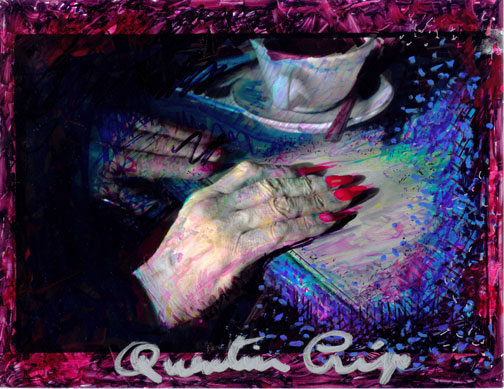 BEING YOUR SPECTACULAR SELF A nod to Quentin Crisp by Robert Rodi |
|
On a Sunday in 1993, my partner Jeffrey and I took Quentin Crisp to brunch. He had been kind enough to supply a testimonial for my first novel, and I felt I ought to repay him in some way.
Crisp, one of the self-appointed "stately old homos of England," was in town for another of his brilliant one-man shows, which we had seen the night before. It had been a love fest, the audience openly adoring him. His theme was the fiercely divisive political scene, and his opening line was "I don't understand all this fuss in American politics about" (and here he enunciated the phrase as though it were from some distasteful alien language) "'fa-mily val-ues.'" A pause; then, sadly shaking his head, "A family is a TERrible thing to happen to ANYbody." As we entered Ann Sather and made our way to our table, every head turned. Crisp was well into his eighties but still dressed with Edwardian dash, sporting a velvet jacket, neckerchief and slouch hat, as well as eyeliner, rouge and lipstick. His fingernails were filthy, and he was reduced to a hobble because his shoes were too small—deliberately so, for he wanted his feet to look tiny, and style, for Crisp, was the supreme directive of life, vastly more important than mere comfort or even mobility. He sang for his supper, amusing us with tales of the great and near-great with whom he'd crossed paths. It wasn't that he was anything so craven as a courtier, for there was certainly no need to curry favor with Jeffrey or me (other than that we were picking up the tab). This was simply his job. Being Quentin Crisp was his life's work, and he spent his latter days proselytizing the benefits of being Exactly Who You Are And No One Else. This was his great theme, and his definition of style was simply the means by which you most thoroughly convey your personality. "The curiosity of your neighbors about you," he famously said, "is a testament to your originality, and you should encourage it." But this doesn't make him a spiritual father of "The Jerry Springer Show." Crisp insisted that the self you put on display be your very best. When, for instance, Elizabeth Taylor and Richard Burton, in Rome to film Cleopatra, complained that media interest in them was so pervasive that they feared they might be photographed in the w.c., Crisp dryly commented, "The solution to the problem is not to build higher and higher walls around your villa. The solution is to urinate with style." I loved him for the politically incorrect aphorisms ("Sex is a mistake" being perhaps the most pithy) with which he twitted and confounded dour gay activists, who seemed unable to live either with him or without him. But it's the earlier half of Crisp's life that has made him one of my preeminent role models. As revealed in his first autobiography, The Naked Civil Servant, he was openly, flamboyantly, even confrontationally gay in a time and place (England, the 1930s and 1940s) where this was virtually a guarantee of physical violence. His absolute refusal to bow to any convention save his own, his willingness to meet any hostile force head on and alone (which continued throughout his life), is still, for me, the high-water mark of gay bravery. The Mattachine Society, after all, had each other; Quentin Crisp relied on only himself. When I told him, at our brunch, that I found him "heroic," he giggled into his napkin. Crisp lived his last years in New York, and very happily. He adored America and Americans, treasuring our freedom and positivity; he loathed class-bound and envy-choked England, and regarded his immigration from thence as nothing less than an escape. I consider it a bad joke of Fate (betraying a regrettable lack of style) that Crisp ultimately died in the land of his birth, having returned there only to tour his last show. When I imagine Crisp in heaven, he's exactly as he was on earth; after all, he achieved complete self-realization long before he died. Wait—one exception: when I picture him in heaven, his tiny shoes fit perfectly. |
| Robert Rodi is the author of six novels, the most recent of which is Bitch Goddess. He is also a screenwriter, a comics scripter, and a founding member of the Chicago gay performance troupe, the Pansy Kings. |
|
Copyright © by Robert Rodi. All rights reserved. Used by permission. Painting by Spider Webb on photograph by Martin Fishman. Copyright © by Spider Webb and Martin Fishman. All rights reserved. Used by permission. |

